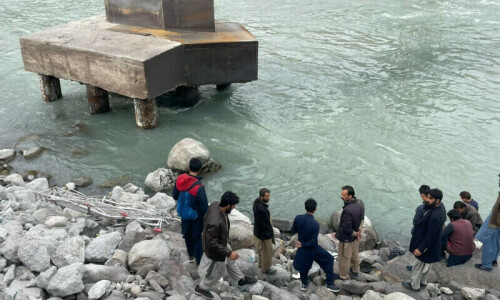ISLAMABAD, May 7: Federal health ministry on Wednesday asked provinces to withdraw all stocks of ineffective snakebite serum being sold in the market.
This serum had been imported by certain suppliers from Saudi Arabia.
Experts say the Saudi Arabian serum is ineffective in Pakistan because the type of snakes in the two countries is quite different. The Arabian serum is specific for the snakes found in the Kingdom.
The health ministry has advised that hospitals should only use serum produced by National Institute of Health (NIH) or the one that is imported from India.
The Indian serum is also considered to be less effective for snake bites in Pakistan, but is still useful.
NIH annually produces 30,000 viles against a requirement of 120,000 viles. The shortfall is then met by importing serum from India.
Pakistan has the highest number of deaths from snake bites in the region. World Health Organization estimates that annually 20,000 snake bite victims die in Pakistan mainly because of lack of proper treatment.
The serum produced by NIH, which is almost half the price of the imported Indian serum, is supplied mostly to government hospitals in the country.
Because of its effectiveness and lesser price, the NIH serum is preferred by the medical practitioners.
NIH Executive Director Maj Gen Masood Anwar, told a media briefing, that his institute was not capable of meeting the country’s requirement because of the limited production capacity of the facility installed there.
He Expressed the hope that a new technique for serum production, which is currently in the experimentation stage, would be able to double NIH’s serum production in six months time.
Besides, he said, the PC-1 for establishment of new serum laboratory is being revised by the health ministry. Once implemented this plan would be able to meet the entire domestic serum need.
However, Gen Anwar said, this could take another 2-3 years. On the issue of shortage of Anti Rabies Vaccine (ARV), the NIH chief said, the institute is in the process of setting up a new facility, which would become fully operational in phased manner spanning over 2-3 years.
Meanwhile, the new facility is expected to start packaging of imported vaccine by the year end.
NIH has also acquired the cell culture technology for ARV from Brazil and would gradually phase out brain sheep ARV.
NIH is currently meeting one-third of the country’s ARV requirement. The rest is met with vaccine imported from France and India. Gen Anwar said the existing facility has no further scope of expansion.










































Dear visitor, the comments section is undergoing an overhaul and will return soon.